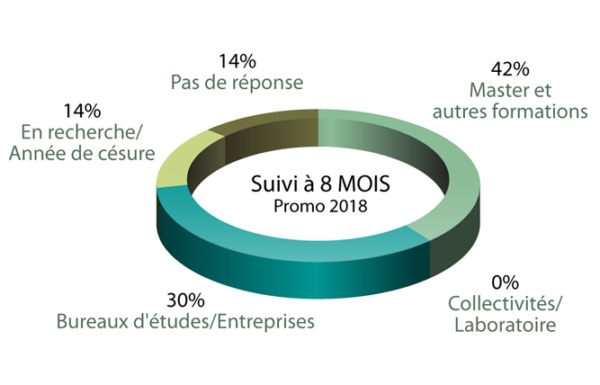Geosciences Pollution Prevention and Treatment course - GPTP
Contact
- Training coordinator: Christine LEREDDE
- Secretary: Rémi MARTIN
Course objectives
The Geosciences, Pollution Preventionand Treatment(GPTP) course is designed to provide a generalist education in Earth Sciences, complemented by professional training in the fields of pollution prevention and treatment, particularly for water and soil, with a 4 to 6 month internship in a professional environment or laboratory .
This course enables students to enter the job market at the end of their bachelor's degree (Bac + 3) at Technician/Assistant-Engineer level (see Professional integration below), or to enter a Master's degree (see Further study below). Thus, the first 2 years are identical to those of the Earth Sciences pathway, with an initial orientation in 2nd year (L2) by the Hydrogeology, Hydraulics, Environmental Chemistry and Ocean, Atmosphere, Hydrosphere TU . The final orientation of the course takes place at the beginning of the 3rd year (L3). This program benefits from the participation oflecturersfrom the Chemistry and Process Engineering departments and from the Polytech engineering school. The training team also draws on a network of local authorities and companies, in particular SMEs, enabling specialization in the following areas:
- hydraulics/hydrogeology/hydrology
- treatment and prevention of waste and pollution
- water purification and treatment
- water and waste legislation
- water microbiology
- water and waste chemistry
This3rd year is structured arounda 4-6 month internship in a company or laboratory, which counts towards 20 ECTS. Created in 2004, this program is primarily designed to meet the demand for Pollution Prevention and Treatment technicians, as expressed through our contacts with the public and private sectors. In addition, this professional degree enables students to pursue a Master's degree.
Conditions of access:
Entrance to L2 or L3 is possible from other courses(other bachelor's degrees, BUT, BTS, CPGE), on the basis of an application and the advice of the pedagogical committee.
Professional integration

Graduatesof the GPTP degree program have been tracked since its inception in 2004-2005. Our surveys show a very good level of professional integration in design offices and local authorities specializing in a wide range of fields:
- waste and wastewater prevention and treatment
- rural and urban hydraulics
- sanitary or territorial technician (competitive examination)
- water resource management and water quality
- flood risks, environmental risks
- soil/river decontamination
- QSE (Quality, Safety, Environment), HSE (Health, Safety, Environment).
The follow-up also shows the career progression of somestudents who, hiredat technicianlevel, move on to engineer-level positions after a few years (e.g.: department/project manageron internal development). Small classes of 15 to 20 students a year ensure that we are in tune with the regional and national job market.

Further studies

:
For GPTP, the emphasis is on learning specific techniques, rather than the disciplinary fundamentals taught mainly in the general Earth Sciences course. Every year, studentsin the GPTP course go on to do a Master's degree, mainly in Environment, Water or Pollution (Montpellier University or others). In addition to the Water master's courses at Montpellier University, the Environment, Water, Pollution and QSE/HSE master's courses, here are some examples of master's courses taken by formerGPTP students(this list is not exhaustive):
- Master in Biology and Environment, specializing in the Functioning and Restoration of Continental Aquatic Environments, Clermont-Ferrand
- Master's degree in Sustainable Development Engineering, specializing in Industrial Process Safety, Environment and Quality (SPIEQ), Nancy
- Master in Chemical Pollution and Environmental Management (PCGE), Université Paris-Saclay
- Ecole d'ingénieurs arts et métiers, Gestion et Prévention des Risques industriels (GPR), Bourget du Lac, France
- Master in Water, Soil and Waste Management and Treatment, Chimie ParisTech
- Master's degree in Water, Soil and Treatment Quality (QuEST), Besançon
- Master in Hydrogeology, Soil and Environment, Avignon
- Master's degree in Environmental Management, MAEVA -STE ( Environmental Management, Valorization and Analysis - Environmental Sciences and Technologies), Marseille, France
- Master of Chemistry and Life Sciences (CSV), Pollution Assessment, Management and Treatment (EGTP), Pau
- Master's degree, Separative Chemistry of Materials and Processes (CSMP), Montpellier.
Program
This course comprises 6 semesters, each validated by 30 ECTS. Specialization begins in the 2nd year (L2) withhydrogeology, hydraulics and environmental chemistry. The TU offered in L3 are specific to the GPTP pathway, and involve teachersfrom disciplines other than Geosciences, as well as external contributors (engineering firms and public bodies). The 3rd year (L3) is structured around a 4-month internship, giving studentsa direct insight into the professional world. This internship counts towards 20 ECTS. It culminates in a report and oral presentation.
Semester 3
- Sedimentary geology, tectonics and cartography (4 ECTS)
- Minerals and rocks (5 ECTS)
- Structural geology (2 ECTS)
- Seismology and data processing (5 ECTS)
- Hydrogeology (5 ECTS)
- Mathematics for TEE (5 ECTS)
- General culture (2 ECTS)
- English (2 ECTS)
Semester 4
- Field internship (Alpes) (5 ECTS)
- Cartography (4 ECTS)
- Geology of France (4 ECTS)
- Environmental chemistry (5 ECTS)
- Ocean Atmosphere Hydrosphere (5 ECTS)
- English
- Hydraulics (5 ECTS)
Semester 5 (September to October)
- Water purification and treatment (5 ECTS)
- Water microbiology (5 ECTS)
- Water and waste chemistry (5 ECTS)
- Soil science (3 ECTS)
- Tools for professional integration (2 ECTS)
- Internship from November to February (10 ECTS)
Semester 6 (March to April)
- Waste treatment (5 ECTS)
- By-product valorization (5 ECTS)
- Water and waste legislation (3 ECTS)
- Extensive effluent treatment processes (3 ECTS)
- Hydrology (4 ECTS)
- Internship from November to February (10 ECTS)